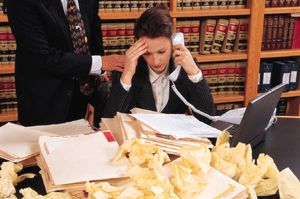 Pressure is seen as healthy and something which will motivate an individual. Some people love to work and live in a pressurised way with lots of deadlines and activities. What distinguishes pressure from stress is that we experience pressure when we have the personal resources we need to deal with the demands being made of us. However, pressure turns into stress when the pressure becomes too great, lasts too long, gives us too little satisfaction, comes too suddenly and results in the perception that it cannot be controlled.
Pressure is seen as healthy and something which will motivate an individual. Some people love to work and live in a pressurised way with lots of deadlines and activities. What distinguishes pressure from stress is that we experience pressure when we have the personal resources we need to deal with the demands being made of us. However, pressure turns into stress when the pressure becomes too great, lasts too long, gives us too little satisfaction, comes too suddenly and results in the perception that it cannot be controlled.
Stress is a very individual matter; a situation which might stress one person may not touch another. In addition, an event which may have proved stressful at one point in our life may not at another as we may have developed additional resources to handle the situation as we have grown older.
There are many causes of stress. Work can be a significant source of stress as many people experience time pressures, excessive workload, have poor relations with colleagues or managers, are bullied or discriminated against, experience poor communications within their organisation, are exposed to rapid and/or continual change, may not be well enough trained to do the job, experience a sense of lack of job security and be frustrated in terms of career development. Stress may be experienced in our personal life through family problems, life changes or life crises, changes in our social life and increasing demands between home and work.
People who experience stress tend to exhibit a variety of characteristics. These characteristics fall into four broad categories; behavioural (the things people do), physical (what happens to our bodies), emotional (how we feel) and an individual’s personal thinking style (our cognitions).
If you are interested in further reading: Coping with Life’s Traumas
